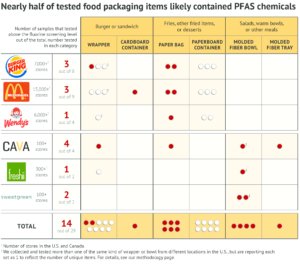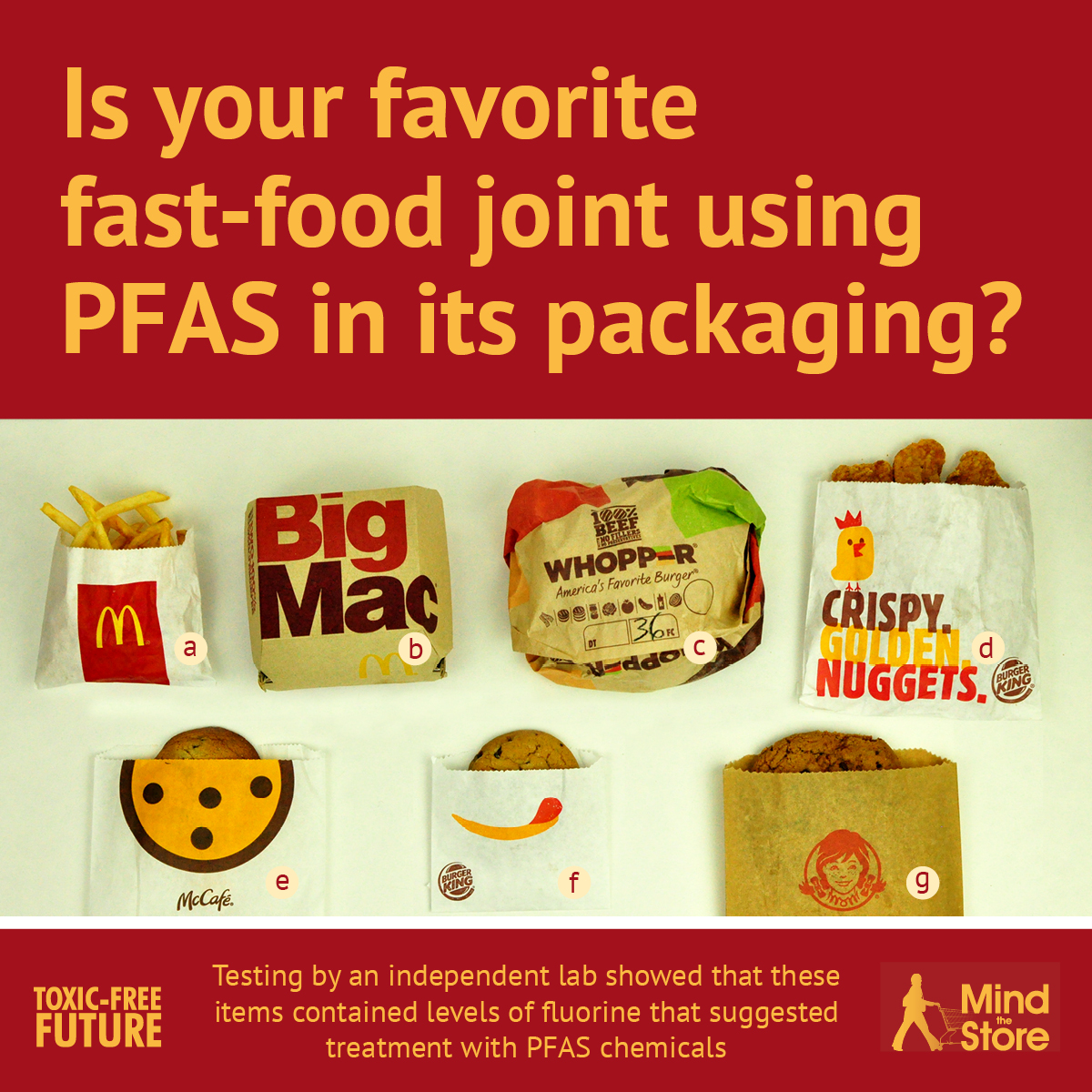Testing suggests toxic PFAS chemicals in packaging from McDonald’s “Big Mac” and Burger King’s “Whopper”
4 out of 6 restaurants studied have no company policy to address these dangerous “forever” chemicals
WASHINGTON, DC—In a new report released today, the Mind the Store campaign and Toxic-Free Future found that nearly half of all take-out food packaging tested from multiple popular food chains contains potentially toxic chemicals. The new investigation shows that all six food chains sampled had one or more food packaging items that likely contain toxic PFAS (per- and polyfluoroalkyl substances)—chemicals known to threaten human health.
The new study, Packaged in Pollution: Are food chains using PFAS in packaging?, analyzed packaging from six national food chains, including top fast-food chains Burger King, McDonald’s, and Wendy’s as well as top health-minded food chains Cava, Freshii, and Sweetgreen. The testing suggests toxic PFAS treatment in both McDonald’s “Big Mac” container and Burger King’s “Whopper” wrapper as well as all of the health-conscious chains’ salad bowls. (See results in the chart below.)
Four out of the six food chains studied do not have a public chemical policy to address toxic PFAS in their food packaging materials. Today, in response to the study, Cava announced it will eliminate PFAS from its food packaging by mid-2021. Sweetgreen also recently announced that it is phasing out PFAS from its bowls by the end of 2020 and has already introduced PFAS-free bowls in one market. Other major retailers and restaurants that have committed to moving away from PFAS include Chipotle, Panera Bread, Taco Bell, Trader Joe’s, and Whole Foods Market.
Testing found that items in two packaging categories— paper bags used for greasy foods along with molded fiber bowls and trays—most frequently tested above the fluorine screening level, suggesting toxic PFAS treatment. Paper bags sampled included a French fry bag from McDonald’s, a chicken nuggets bag from Burger King, and cookie bags from all three burger chains. On the other hand, a packaging material category found to be free of PFAS were paperboard containers, specifically, the cartons and clamshells used for fried foods and desserts at burger chains. All of these sampled paperboard items tested below the fluorine screening level, suggesting that they are PFAS-free.
Scientists have found links between exposures to PFAS and a wide range of health problems. “These toxic chemicals are linked to serious health problems like cancer, liver damage, decreased fertility, and asthma,” explains Dr. Linda S. Birnbaum, Scholar in Residence at Duke University, Scientist Emeritus and Former Director of the National Institute of Environmental Health Sciences (NIEHS) and National Toxicology Program (NTP). “PFAS can weaken our immune system, making us more vulnerable to infectious diseases like COVID-19.”
A consortium of scientists recently published a new scientific statement emphasizing the dangerous health impacts of PFAS and other toxic chemicals in food packaging, noting how easily these chemicals migrate out of packaging. “PFAS chemicals don’t ever break down. They permanently remain in the environment and easily move into people, persisting in our bodies,” adds Dr. Birnbaum.
The investigation commissioned an independent laboratory to measure total fluorine in a total of 38 food packaging samples from 16 locations across six chains. Nine out of the 38 samples were replicates, resulting in 29 unique sample items for analysis. Samples were collected at food chains in and around New York City, Seattle, WA, and Washington, DC in January 2020 and were analyzed in February 2020.
The study found that 14 food packaging items tested above the fluorine screening level. Testing for total fluorine is a common way to assess the use of toxic PFAS chemicals. At least one food packaging item from each of the six food chains studied tested above the fluorine screening level, suggesting the presence of PFAS chemicals.
“Whether the chains are serving burgers, fries, or salad, they owe it to their customers to serve it up in safe packaging,” explains Erika Schreder, Science Director at Toxic-Free Future and co-author of the study. “We found many instances of packaging that’s PFAS-free—there’s no reason for these chains to choose any food packaging that contains PFAS. Food chains like McDonald’s shouldn’t be using this toxic packaging.”
PFAS are chemicals used to impart stain, grease, and water resistance to food packaging, carpeting, upholstery, and apparel. The chemicals are also used in firefighting foam, ski wax, and industrial applications. Toxic exposures continue even after the packaging is disposed of. Evidence shows that these chemicals can make their way back to people through drinking water, food, and air. Food crops and gardens can become polluted with PFAS-containing compost, as shown from research demonstrating plants taking up PFAS from soil. Scientists often refer to PFAS as “forever chemicals” because they don’t break down in the environment.
“These toxic chemicals continue to contaminate people and pollute the environment long after the disposable packaging is discarded. And there’s really no need for it,” said Mike Schade, Mind the Store campaign director.
The Food and Drug Administration (FDA) has prohibited the use of only a small number of chemicals within the PFAS class in food packaging, and just last week announced that manufacturers have agreed to phase out use of another subset of PFAS. However, FDA continues to allow the use of many PFAS. Mounting evidence on the dangers of PFAS exposure has led to the passage of restrictions on PFAS in food packaging over the last few years in San Francisco and Berkeley as well as in states including Washington and Maine. In July 2020, the New York Legislature approved a bill to ban PFAS in food packaging, which now awaits the governor’s signature. In Europe, Denmark enacted a ban on PFAS in cardboard and paper food packaging that went into force July 1, 2020.
Without national regulation of toxic PFAS, accelerated action from food retailers in addressing PFAS in food-packaging materials is necessary to reduce exposures to people and the environment. “Multiple major food chains have now announced new policies on PFAS. So, clearly, safer alternatives exist and are being used. Those that haven’t stepped up have the ability to do so,” Schade explains. “As the largest fast-food chain in the world, McDonald’s has a responsibility to its customers to keep them safe. These dangerous chemicals don’t belong in its food packaging. I, for one, am NOT ‘lovin’ it.’” Today, the Mind the Store campaign and its partners launched a petition to McDonald’s urging them to take action by committing to the elimination of PFAS in their food-packaging materials.

MIND THE STORE CAMPAIGN
The national Mind the Store campaign challenges big retailers to eliminate toxic chemicals and replace them with safer alternatives. The campaign coordinates the annual retailer report card that benchmarks and scores major retailers on their safer chemicals policies and implementation programs. www.mindthestore.org and www.retailerreportcard.org
TOXIC-FREE FUTURE
Toxic-Free Future advocates for the use of safer products, chemicals, and practices through advanced research, grassroots organizing, and consumer engagement to ensure a healthier tomorrow. www.toxicfreefuture.org
# # #
MEDIA CONTACT
Stephanie Stohler
Communications Director
[email protected]

